diary
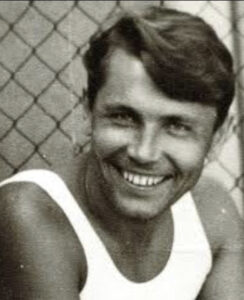 We have heard of people taking care of their medical needs before. Some have stitched themselves, and others have removed a bullet or other such object. Some have even performed surgery on themselves, although that sound a little bit like insanity to me. Nevertheless, if it comes down to perform surgery on yourself or die, I guess the logical choice would be to perform the surgery on yourself, if you had any idea what you were doing. A medic, Robert Kerr “Jock” McLaren, who was a veterinarian by trade, took out his own appendix during his service with the Second Australian Imperial Force, in order to save his own life. So, McLaren set about to remove his own appendix…in the jungle, with a pen knife, two spoons, and coconut fibers. That was an amazing thing, but it happened in 1944 and he even had no anesthetic. It is shocking, but he would not be the last one to do that.
We have heard of people taking care of their medical needs before. Some have stitched themselves, and others have removed a bullet or other such object. Some have even performed surgery on themselves, although that sound a little bit like insanity to me. Nevertheless, if it comes down to perform surgery on yourself or die, I guess the logical choice would be to perform the surgery on yourself, if you had any idea what you were doing. A medic, Robert Kerr “Jock” McLaren, who was a veterinarian by trade, took out his own appendix during his service with the Second Australian Imperial Force, in order to save his own life. So, McLaren set about to remove his own appendix…in the jungle, with a pen knife, two spoons, and coconut fibers. That was an amazing thing, but it happened in 1944 and he even had no anesthetic. It is shocking, but he would not be the last one to do that.
As research groups began spending time in Antartica, several have found that they have suddenly needed medical care and there was no one there to do it, but them. One female doctor had to perform a biopsy on herself, which while it was a serious situation, was not a procedure to the degree of an appendectomy. Then on April 30, 1961, Dr. Leonid Rogozov, who was a Soviet 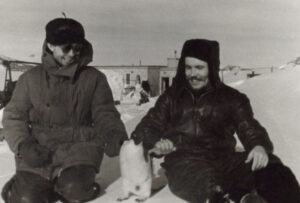 surgeon, found himself stranded in Antarctica, and in need of an appendectomy. Dr Rogozov was a Soviet general practitioner. He took part in the sixth Soviet Antarctic Expedition in 1960–1961, and unfortunately for him, he was the only doctor stationed at the Novolazarevskaya Station at that time. While he was there, he developed appendicitis. It was not something that could wait, as it was a serious attack, so he had to perform the appendectomy on himself.
surgeon, found himself stranded in Antarctica, and in need of an appendectomy. Dr Rogozov was a Soviet general practitioner. He took part in the sixth Soviet Antarctic Expedition in 1960–1961, and unfortunately for him, he was the only doctor stationed at the Novolazarevskaya Station at that time. While he was there, he developed appendicitis. It was not something that could wait, as it was a serious attack, so he had to perform the appendectomy on himself.
The station was newly constructed, and the 12 men inside were cut off from the outside world by the polar winter by March of that year. When the polar winter sets in, planes and ships cannot get into the area, for any reason. The symptoms began on the morning of 29 April 1961. At first they were mild, with Rogozov experiencing general weakness, nausea, and moderate fever, but later pain in the lower right portion of the 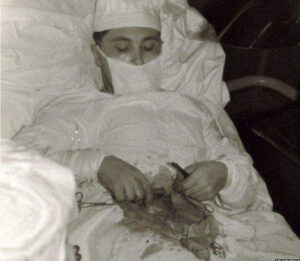 abdomen started to become more severe. His symptoms were classic, and he knew that he had acute appendicitis. The British Medical Journal reported, “He knew that if he was to survive, he had to undergo an operation, but he was in the frontier conditions of a newly founded Antarctic colony on the brink of the polar night. Transportation was impossible. Flying was out of the question, because of the snowstorms. And there was one further problem: he was the only physician on the base.” Self surgery was his only solution.
abdomen started to become more severe. His symptoms were classic, and he knew that he had acute appendicitis. The British Medical Journal reported, “He knew that if he was to survive, he had to undergo an operation, but he was in the frontier conditions of a newly founded Antarctic colony on the brink of the polar night. Transportation was impossible. Flying was out of the question, because of the snowstorms. And there was one further problem: he was the only physician on the base.” Self surgery was his only solution.
Being a logical man, Rogozov wrote in his diary, “It seems that I have appendicitis. I am keeping quiet about it, even smiling. Why frighten my friends? Who could be of help? A polar explorer’s only encounter with medicine is likely to have been in a dentist’s chair.”

 Some books should have a permanent copyright, and it seems like insanity to me that they don’t. As copyright laws go, a work is typically protected for 70 years after the creator’s death. That would mean that a book like Anne Frank’s diary, the copyrights would expire in 2015 because of her untimely death in a concentration camp, and the book would become public domain. It seems very wrong that her diary…her own private words…could become public domain. A diary is so private, but then I guess that when they published her diary, any semblance of privacy no longer existed.
Some books should have a permanent copyright, and it seems like insanity to me that they don’t. As copyright laws go, a work is typically protected for 70 years after the creator’s death. That would mean that a book like Anne Frank’s diary, the copyrights would expire in 2015 because of her untimely death in a concentration camp, and the book would become public domain. It seems very wrong that her diary…her own private words…could become public domain. A diary is so private, but then I guess that when they published her diary, any semblance of privacy no longer existed.
Anne Frank’s diary, the story of which abruptly ended when the family that was secretly hiding them was betrayed, and the two families they were hiding, captured, was preserved after their capture, and given to Otto Frank after he survived the Holocaust. After much soul searching, Otto Frank decided to publish his younger daughter’s story, because people needed to know the truth. It was a selfless move that must have been heartbreaking for a man who had lost everything in the Holocaust…a man whose daughters would never grow to adulthood, never marry, never have children, never grow old. The book became the only way to extend Anne’s life, and through her words to also extend the lives of her mother, sister, and the others who were in hiding. As such, it seems only fitting that the work continue as a copyrighted work beyond 2015, but the law was the law…or was it?
The Swiss foundation, that holds the copyright, made a move to extend the protection of the book. It was a bold, yet simple move. They made Anne’s father, Otto Frank co-author of the book. Of course, a move like this must hold some merit as well. Otto could not be named co-author just because he was her father. While The Diary of Anne Frank was compiled of journal entries made by Anne, it was her father who read through her journal to put together the final product. Otto admitted to having censored some of the content, leaving out 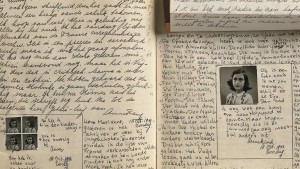
 certain parts of her story that he decided were unsavory or too personal. It made sense. After all, this was his daughter, and she was becoming a woman, with the curiosities of that transition. His work in editing her story gave credence to naming him co-author. Otto survived World War II and didn’t pass away until 1980. That now means that the copyright could be pushed back to 2050, as he was officially deemed co-author.
certain parts of her story that he decided were unsavory or too personal. It made sense. After all, this was his daughter, and she was becoming a woman, with the curiosities of that transition. His work in editing her story gave credence to naming him co-author. Otto survived World War II and didn’t pass away until 1980. That now means that the copyright could be pushed back to 2050, as he was officially deemed co-author.
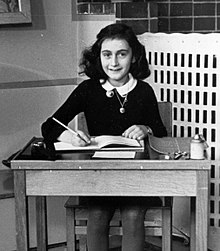
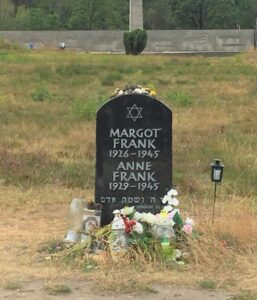 On June 12, 1942, Anne Frank, was a young Jewish girl living in Amsterdam. It was her thirteenth birthday, and as a gift, she was given a diary. Diaries have long been a big deal for girls. I know very few of those in my generation who didn’t have one. Most of those who received them, did little with them. I know that my diary (which I still have, by the way) contains mostly the gibberish of a young girl…mostly bored with the idea of journaling the meager events of my life…or at least that is how I saw them at the time. Looking back, I wish I had maybe taken the whole journaling/diary thing more seriously, because my life, while not as intense as that of Anne Frank, did have meaning, and those events that might have been considered important to my children, grandchildren, and great grandchildren have been, for the most part, lost to the forgetfulness of childhood.
On June 12, 1942, Anne Frank, was a young Jewish girl living in Amsterdam. It was her thirteenth birthday, and as a gift, she was given a diary. Diaries have long been a big deal for girls. I know very few of those in my generation who didn’t have one. Most of those who received them, did little with them. I know that my diary (which I still have, by the way) contains mostly the gibberish of a young girl…mostly bored with the idea of journaling the meager events of my life…or at least that is how I saw them at the time. Looking back, I wish I had maybe taken the whole journaling/diary thing more seriously, because my life, while not as intense as that of Anne Frank, did have meaning, and those events that might have been considered important to my children, grandchildren, and great grandchildren have been, for the most part, lost to the forgetfulness of childhood.
Many of us have heard of, read about, or seen the movie about the events of Anne Frank’s short life. One short month after receiving her diary, Anne and her family went into hiding from the Nazis in rooms behind her father’s office. Anne’s sister, Margot, received a call-up notice around 3pm on July 5, 1942. The Frank family had planned to go into hiding on July 16, 1942, but they decided to leave immediately so that Margot would not have to be deported to a “work camp.” The family left a false trail indicating that they had gone into hiding in Switzerland. According to Anne’s diary, Margot kept a diary of her own, but no trace of Margot’s diary has ever been found. This and her time in the hands of the Nazis was the main period of her diary, because as we know, Anne did not survive the Holocaust into which she and her family had been dragged. The hiding place was not discovered immediately, of course, and for the next two years, the Franks and four other families were hidden, fed, and cared for by Gentile friends. They lived in an annex, whose entrance was hidden behind a moveable bookcase. Following a tip in 1944, the families were discovered by the Gestapo. The Franks were taken to Auschwitz, where Anne’s mother died. Friends in Amsterdam searched the rooms and found Anne’s diary hidden away. They had hoped to save any personal items, so they could be returned to the family, should any of them survive.
Anne and her sister were sent to another camp, Bergen-Belsen, where Anne died a month before the war ended. Anne’s father survived Auschwitz, and after much soul searching, he published Anne’s diary in 1947 as “The Diary of a Young Girl.” The book has been translated into more than 60 languages. Had it not been for World War II, the Holocaust, and Anne’s tragic death from Typhus in the Bergen-Belsen concentration camp in February 1945, the diary would have most likely have been published, or even written in the way that it was. 
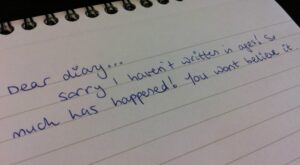 The reality is that most diaries aren’t immensely interesting. Most are written by young girls with drama queen emotions, who are bored with their lives, because they are certain that nothing cool happens. Anne’s diary was interesting, because she wasn’t sure how long her life would be, and she wanted to know everything…before it was too late.
The reality is that most diaries aren’t immensely interesting. Most are written by young girls with drama queen emotions, who are bored with their lives, because they are certain that nothing cool happens. Anne’s diary was interesting, because she wasn’t sure how long her life would be, and she wanted to know everything…before it was too late.
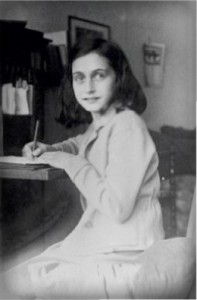 I am not related to Anne Frank, but her story is one that, while I cannot relate to personally, nevertheless touches me deeply. Anne, like another woman who I have long respected, Corrie ten Boom, went through some of the deepest forms of hatred there can possibly exist in this world. Anne was a Jewish girl, just turning 13 on this day, June 12, 1942, and Corrie ten Boom was a Dutch Christian woman who helped as many Jewish people as she could during the ugliness that was Hitler’s reign, and that would eventually take Anne’s life. The two women never met in person, to my knowledge, but while Anne may never have heard of Corrie, I’m certain that Corrie heard of Anne. The plight of the Jewish people touched Corrie ten Boom deeply too…deeply enough that she and her family risked their lives trying to hide the Jewish people from Hitler’s men, and act that eventually precipitated their capture and imprisonment, because it was against the law to help the Jewish people.
I am not related to Anne Frank, but her story is one that, while I cannot relate to personally, nevertheless touches me deeply. Anne, like another woman who I have long respected, Corrie ten Boom, went through some of the deepest forms of hatred there can possibly exist in this world. Anne was a Jewish girl, just turning 13 on this day, June 12, 1942, and Corrie ten Boom was a Dutch Christian woman who helped as many Jewish people as she could during the ugliness that was Hitler’s reign, and that would eventually take Anne’s life. The two women never met in person, to my knowledge, but while Anne may never have heard of Corrie, I’m certain that Corrie heard of Anne. The plight of the Jewish people touched Corrie ten Boom deeply too…deeply enough that she and her family risked their lives trying to hide the Jewish people from Hitler’s men, and act that eventually precipitated their capture and imprisonment, because it was against the law to help the Jewish people.
Hitler hated the Jewish people, and in reality, was probably afraid of them…hence his need to rid himself of them. Hitler was insane. During the time that Hitler was taking the Jewish people prisoner, and killing them, a young girl named Anne Frank was turning 13, and was given a diary for her birthday. Having been a young girl with a diary, I can relate to the excitement of getting a diary in which to record your deepest thoughts, hopes, dreams, and secrets. I can also say that at that time, I felt like my life was relatively boring, and so writing in my diary quickly became a chore, and was soon forgotten. I have to wonder if Anne’s diary might have suffered the same fate…had things been different. Most kids get pretty bored with writing down their thoughts everyday, but Anne’s life was about to change forever. She was about to spend the next two years in hiding in a secret room in her father’s office, along with four other families, dependent on loving Christians for their every need.
The Nazis were coming, and they were determined to kill every Jewish person they could. Anne and her family had to go into hiding. And so it was, that a young girl trapped behind a wall that led to a secret room, where silence was essential for survival, began to write down her thoughts and experiences in what would become the most read diary in history. Anne would not live to become an adult, to marry, or to have children, and yet, she would go on to become one of the most well known children in history. My great aunt, Bertha Schumacher Hallgren said that anyone could become a famous writer, if they just wrote about the events of their life, and colored it with some information about the time in history in which they lived. That is exactly what Anne Frank  did. I have to think that she assumed that no one would care about her little life spent in hiding, much less about how a 13 year old girl felt about it, but after she died of Typhus in a prison camp called Bergen-Belsen, just one month before the end of the war, they did care. The Christian friends found her diary after their capture, and kept it in the hope of giving it back to her. Her father lived through that horrible time, and the diary was returned to him. He had it published in her honor in 1947. The book was called “The Diary of a Young Girl,” and has been made into a movie too, because in the end, it told the world about a very ugly time in history.
did. I have to think that she assumed that no one would care about her little life spent in hiding, much less about how a 13 year old girl felt about it, but after she died of Typhus in a prison camp called Bergen-Belsen, just one month before the end of the war, they did care. The Christian friends found her diary after their capture, and kept it in the hope of giving it back to her. Her father lived through that horrible time, and the diary was returned to him. He had it published in her honor in 1947. The book was called “The Diary of a Young Girl,” and has been made into a movie too, because in the end, it told the world about a very ugly time in history.
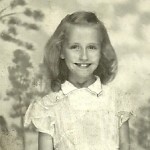 As my sisters and I were going through our parents things a couple of weeks ago, we came across our mom, Collene Byer Spencer’s diary. It was given to her by her sister Virginia and her husband in 1947, when Mom was just eleven years old. As we drew names for the different items we found, I received the diary. My sister, Allyn Hadlock had read a few passages from it, and thought it felt wrong somehow, but since Mom is no longer with us, I think it’s ok to read it. So tonight, I have been doing just that. The diary is a five year diary, and it was written in sporadically from 1947 to 1951. Funny thing about diaries…your well meaning plan to writing in them faithfully every day, always seems to dwindle into once in a great while pretty quickly. Having had a diary myself…wow, I wonder where that got to, and if we will come across it somewhere in all of Mom’s things. What things did I write in there that might be embarrassing? The rambling of a silly little girl…all but meaningless today. Well, all I can say is that I hope we don’t come across it.
As my sisters and I were going through our parents things a couple of weeks ago, we came across our mom, Collene Byer Spencer’s diary. It was given to her by her sister Virginia and her husband in 1947, when Mom was just eleven years old. As we drew names for the different items we found, I received the diary. My sister, Allyn Hadlock had read a few passages from it, and thought it felt wrong somehow, but since Mom is no longer with us, I think it’s ok to read it. So tonight, I have been doing just that. The diary is a five year diary, and it was written in sporadically from 1947 to 1951. Funny thing about diaries…your well meaning plan to writing in them faithfully every day, always seems to dwindle into once in a great while pretty quickly. Having had a diary myself…wow, I wonder where that got to, and if we will come across it somewhere in all of Mom’s things. What things did I write in there that might be embarrassing? The rambling of a silly little girl…all but meaningless today. Well, all I can say is that I hope we don’t come across it.
That said, I do remember my own diary, and much like my mother’s it seems that at the age when a diary becomes so interesting, and all the rage, life always seems to take on a bit of the boring. I suppose that is because nobody’s life can be all bells and whistles every day. At some point, you always find yourself with very little to say about the day’s events. Life’s days aren’t often filled with daily exciting things that are worthy of filling the pages of a diary…at least not when you are eleven. I really wish I had maybe been a little more 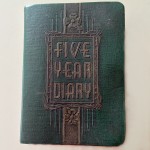 persistent about writing in my diary or a journal in later years though, because I now see the value of such writings.
persistent about writing in my diary or a journal in later years though, because I now see the value of such writings.
I did learn some things about my mother, and even about my dad. Mom met dad when she was just ten years old. She told me that the first time she saw him she thought that he was the most handsome man she had ever seen. Dad was twelve years older than Mom, so when she met him, he would have been 22 years old, and at ten, Mom was just about getting to the age where boys were suddenly interesting, and an older man who was as handsome as my Dad was…well, it must have felt like meeting a movie star. Dad liked Mom right away, but probably not is a romantic way. He was a friend of the family, and so came to visit often. During the next few years it appeared to me that Mom had a bit of a crush on Dad, but maybe tried not to let everyone know that, because of the inevitable teasing that would go along with it. By 1949, Dad’s opinion started to mean more to Mom, and when she cut her hair to look more grown up and he didn’t like it…because Dad has always loved long hair, she was upset, and said, “I got my hair cut, and I like it. Al was mad at me, but he doesn’t have a lease on me, so how I wear my hair is none of his biz!” For his part, Dad told her he was going to grow a beard, and he did. She pretended not to notice. In her early years and even while Dad was coming around a lot, Mom was a bit of a boy crazy girl. I always wondered where I got that from, and now I know. I had a boyfriend from the moment I started school, and it appears that Mom did too, quite a lot.
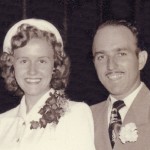 By the time Mom was fifteen years old in 1951, Dad was already sure that she was the girl he wanted to spend the rest of his life with. Their romance reminded me a little bit of Laura Ingalls in the Little House on the Prairie books. Almanzo knew he wanted to marry Laura, and she did too, but her dad said they had to wait to marry until she was eighteen. In Mom’s case, it wasn’t her dad who thought they should wait until she was eighteen, but her. At fifteen years of age, she had to get to know herself first. In the end, they would only wait until she was seventeen, but it did not matter. Theirs was a match made in Heaven, and a love to last a lifetime. And the ramblings of a girl writing in her diary trying to figure out just how life and love worked while written sporadically, were clear to this reader anyway.
By the time Mom was fifteen years old in 1951, Dad was already sure that she was the girl he wanted to spend the rest of his life with. Their romance reminded me a little bit of Laura Ingalls in the Little House on the Prairie books. Almanzo knew he wanted to marry Laura, and she did too, but her dad said they had to wait to marry until she was eighteen. In Mom’s case, it wasn’t her dad who thought they should wait until she was eighteen, but her. At fifteen years of age, she had to get to know herself first. In the end, they would only wait until she was seventeen, but it did not matter. Theirs was a match made in Heaven, and a love to last a lifetime. And the ramblings of a girl writing in her diary trying to figure out just how life and love worked while written sporadically, were clear to this reader anyway.

